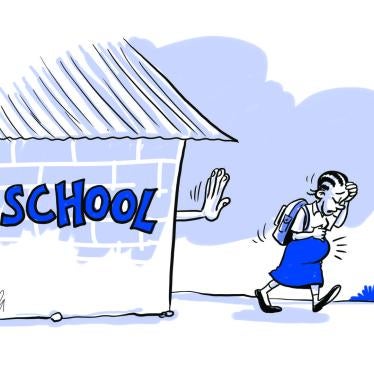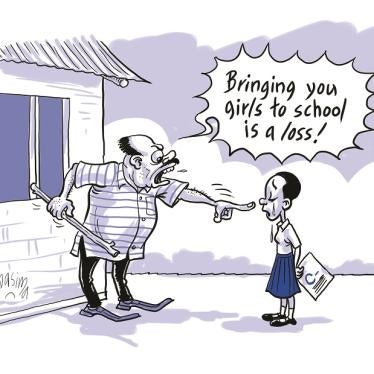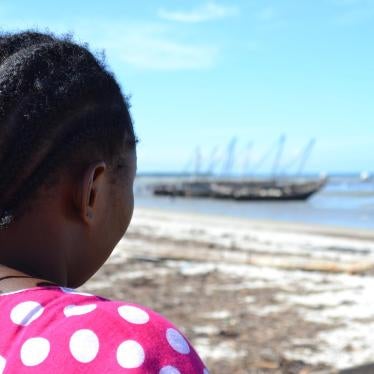Introduction
On March 31, 2020, the World Bank’s Board of Executive Directors approved a controversial US$500 million loan to the government of Tanzania for its secondary education program. At the heart of this controversy is Tanzania’s adherence to a school ban, endorsed by President John Magufuli since 2017, that discriminates against pregnant students, adolescent mothers, and married girls. In recent weeks, there has been much confusion around the Tanzania government’s stance on the issue of allowing pregnant girls to study in public schools.
The World Bank has also issued inaccurate information that dismisses the existence of an expulsion policy, and terms girls who are excluded as merely “dropping out.” The World Bank has also failed to listen to appeals from civil society groups who have documented the harm of this policy, and expressed concerns that the World Bank, Tanzania’s largest multilateral donor, for endorsing the government‘s discriminatory practices and stance by supporting the newly approved loan. This Q&A addresses information gaps associated with the loan, and provides further information on the government and the World Bank’s human rights obligations, as well as recommendations on what both need to do to rectify the rights of all girls to education in Tanzania.
What does Tanzania’s expulsion policy and school ban say?
Tanzanian officials have often argued that they do not have a policy that expressly says pregnant or married girls cannot go to school. However, the expulsion of pregnant girls from public schools is permitted under Tanzania’s education regulations, which state that “the expulsion of a pupil from school may be ordered where … a pupil has … committed an offence against morality” or “entered into wedlock.” The policy does not explain what offenses against morality are, but school officials often interpret pregnancy as such an offense.
Tanzanian President John Magufuli has vigorously supported a ban on pregnant students and vowed to uphold it throughout his term. If there was any lack of clarity on this policy, Magufuli’s comments entrenched it into official government policy. Magufuli also wrongfully accused nongovernmental organizations that have been urging the government to allow teen mothers back in school of “being used by foreign agents”. Home Affairs Minister Mwigilu Nchemba threatened to rescind the registration of groups advocating for the education of teenage mothers. The authorities have also arrested some schoolgirls for becoming pregnant and harassed their families.
Senior officials in Tanzania‘s Ministry of Education, Science and Technology have told Human Rights Watch that allowing pregnant girls to remain in school will normalize out-of-wedlock pregnancy, absolve the girls of punishment, and create a “domino effect” by which more girls become pregnant. Such arguments are not grounded in any authoritative studies. Tanzanian officials routinely subject girls to forced pregnancy testing as a disciplinary measure and permanently expel those who are pregnant. Mandatory pregnancy testing itself is a serious infringement of girls’ rights to privacy, equality, and autonomy, and may cause some to drop out on their own.
While a lot of public commentary has focused on secondary school girls, according to this policy, primary school girls who are pregnant or married also get expelled, and have no real alternatives to return to formal schooling.
On April 6, 2020, a statement issued by the Ministry of Education, Science and Technology about the World Bank Loan confirmed that girls would benefit from the Bank’s Secondary Education Quality Improvement Program (SEQUIP) program that facilitates “alternative education pathways” (AEP), but it did not state that pregnant girls could return to public schools. Tanzania’s ban remains in place.
How many girls are affected by this policy?
There is no accurate data, but different sources estimate that thousands of girls have been affected by the policy. The World Bank estimates 5,500 pregnant students stop going to school every year, although previous estimates indicate that close to 8,000 students have been forced to drop out of school each year.
Due to the widespread and deeply entrenched practice of expelling pregnant girls, often in very humiliating ways, girls stop going to school because they know that they will be expelled.
What opportunities exist for pregnant or married girls who are expelled to return to formal education?
There are two options to continue with education for all children who drop out of school to enable them to take the same national examinations (at form four or O Levels) as students attending public secondary school, receive certification of completion of secondary school, and proceed on to higher secondary school (A Levels), which is not compulsory. They can either enroll in private secondary school or they can enroll in Open Schools and Folk Development Colleges, which the SEQUIP program has now consolidated as the “alternative education pathways” (AEP).
Students who want to complete O Levels, like girls who are expelled from school after becoming pregnant or those who dropped out of school to work, have to self-study or register and pay fees that can amount to around Tanzanian Shillings (TZS) 500,000 (US$227) annually for tuition in private colleges. Students pursuing this route will complete a course that condenses the entire four-year lower secondary school curriculum (O Levels) in two years. Access to good vocational training is difficult and costly, too. Adolescents who leave lower secondary school before completing their O Levels lack the accreditation and studies needed to pursue an official vocational education and skills training degree.
Instead, adolescents who have dropped out may enroll for short vocational courses and
get a basic certificate of skills. While folk development centers provide students with basic
knowledge and technical skills to be self-employed and self-reliant, they do not equal a
full vocational and training degree, which is only provided in fully certified Vocational Education and Training Authority (VETA) centers. At present, there is disparate coverage of vocational training schools -- and all charge tuition fees. Human Rights Watch research shows that some adolescents are only able to enroll in technical and vocational programs through nongovernmental organizations, which offer scholarships and assist students by handling administrative barrier and often pay for boarding facilities as well.
What concerns are there regarding the World Bank’s $500 million education loan to Tanzania?
There are a number of concerns with regards to this loan. They include: financial support and endorsement of a parallel discriminatory education system that would leave out many children from accessing secondary education; the failure to provide accurate information about the government’s expulsion policy, challenges around participation by civil society groups in monitoring implementation of the SEQUIP program; and the World Bank’s failure to adhere to its own internal human rights guidelines.
The World Bank should be working with governments to move education systems toward full inclusion and accommodation of all girls in public schools, including those who are pregnant or parents. Instead, the World Bank failed to use its leverage and is now supporting Tanzania’s discriminatory ban and practices.
In November 2018, the World Bank withheld a $300 million loan for secondary education in Tanzania in part because of the government’s mistreatment of pregnant girls. In response, the government agreed to tackle discrimination against girls, reform provisions of its Statistics Act that made it a crime to publish statistics without the approval of the National Bureau of Statistics, and curtail government officials’ incitement of violence against Tanzania’s lesbian, gay, bisexual, and transgender (LGBT) population.
Hafez Ghanem, the World Bank’s vice president for Africa, was quoted then as saying: “Girls’ education is central to development, we are a development institution, we cannot accept that some girls be denied education. If we accept that, we won’t be doing development.”
Non-Fulfillment of compulsory education
The World Bank loan provides funds for the Secondary Education Quality Improvement Program (SEQUIP), which aims to expand girls’ access to secondary schooling by building more classrooms, improving the quality of textbooks and teaching, tackling gender-based violence within schools and during the journey to school, and promoting a gender-sensitive school environment. However, SEQUIP will only allow girls to study in so-called “alternative education pathways,” or parallel education centers, which the World Bank has characterized as a viable secondary school alternative. But these alternative education pathways cannot be portrayed as providing the equivalence of education in formal public lower secondary schools.
- Out-of-school children can attend the AEP to catch-up and study a condensed version of the secondary school curriculum. Human Rights Watch conducted research into these programs and found serious problems around fees, low quality of education and challenges with access even for those who were trying get into them.
- AEP centers are fee-based, whereas primary and lower secondary public schools are tuition and cost free. The World Bank has said they want to make AEP education more affordable, but not free. Also, students in secondary schools access a variety of subjects, whereas AEP’s will provide a condensed version of the curriculum and will not cover all the subjects or offer the same education experience.
- Studying in these alternative centers is the only option for girls expelled from schools for being pregnant. They will not be able to go back to primary or lower secondary schools.
Discrimination and misrepresentation of government policies and practice
By approving the loan to Tanzania, the World Bank is effectively endorsing inadequate measures like parallel education options that maintain a discriminatory status quo and could embolden the government in its abusive policies.
The World Bank has also misrepresented the facts about the expulsion policy. In its endorsement of the loan, the World Bank considered that girls who are pregnant or have a baby merely “drop-out” of school. It also said that “there is no government policy that states that students who become pregnant must be expelled from public schools.” In framing the issue this way, the World Bank disregarded independent evidence that shows that, in practice, girls are expelled and humiliated by school officials and teachers when forced to take a pregnancy test or discovered to be pregnant, and often rejected by their own peers as a result.
Failure to adhere to World Bank’s Environmental and Social Framework (ESF)
The World Bank’s backtracking on pregnant girls’ right to education also raises concerns about the bank’s broader commitment to implementing its Environmental and Social Framework, which guarantees that bank loans will not be used to further discrimination, and that World Bank funds will not be used to undermine marginalized groups.
Serious concerns with abuses against civil society, freedom of expression
The success of the SEQUIP project will partly be informed by participation of Tanzanian civil society groups in monitoring its implementation. Tanzanian nongovernmental organizations wrote to the World Bank’s Board of Executive Directors expressing their concerns with the creation of this alternative education system, and have subsequently expressed their concerns with the World Bank’s endorsement of this program.
The current human rights environment in Tanzania does not support independent monitoring of this loan by such groups. Since 2015, Tanzania has intensified its repression of the media, human rights defenders, and opposition parties. The government has severely restricted the activities of nongovernmental organizations, including those protesting the treatment of pregnant girls and young mothers by threatening to remove their nongovernmental status.
What should Tanzanian authorities do?
The Tanzania government should immediately end the ban on pregnant and married girls or young mothers attending public schools. It should adopt a human rights-compliant “continuation” policy that would allow pregnant girls to remain in school for as long as they choose, and implement measures to ensure girls can remain in school and succeed in their studies. President Magufuli should publicly retract his destructive comments against pregnant girls’ education and direct his government to support all girls to go to school.
The government should also urgently adopt strong measures to end widespread sexual violence against schoolgirls, adopt a total ban against the use of corporal punishment in schools, work to end child marriage by immediately changing Tanzania’s Law of Marriage Act to increase the age of marriage to 18. The government should also equip all young people with adequate sexual and reproductive health information and services to make informed decisions about sex.
What should the World Bank do?
Human Rights Watch understands the importance of expanding quality secondary education in Tanzania, but strongly believes this cannot be at the expense of girls’ future. Girls’ right to education is not expendable.
All governments should take immediate measures to ensure that secondary education is available and accessible to all free of charge and make education compulsory through the end of lower secondary school.
The World Bank should ensure pregnant girls and adolescent mothers access public primary and secondary schools without restrictions or being forced to choose a parallel system, while ensuring teenage mothers – who may have been out of school for a protracted period of time because of the government‘s ban – are able to access AEPs so that they can complete basic education. The SEQUIP loan should provide both options, and ensure quality education is guaranteed throughout both, all the while guaranteeing a commitment to ensure both systems are tuition free.
The World Bank should not disburse the initial tranches of the loan, planned for 2021, until the government respects its obligations to guarantee equal access to free and compulsory primary education and equal access to secondary education for girls. A minimum requirement includes the adoption of a notice by the Ministry of Education, Science and Technology communicating the end of the school ban and instructing all school officials to enroll pregnant girls and adolescent mothers.
As part of SEQUIP, the World Bank and other development partners should work with the Tanzanian government to design a “continuation” policy to ensure pregnant students and adolescent mothers are supported to stay in school and complete secondary education. SEQUIP should also prioritize the roll-out of comprehensive sexuality education to ensure all students are able to access adequate information, in line with international human rights standards.








